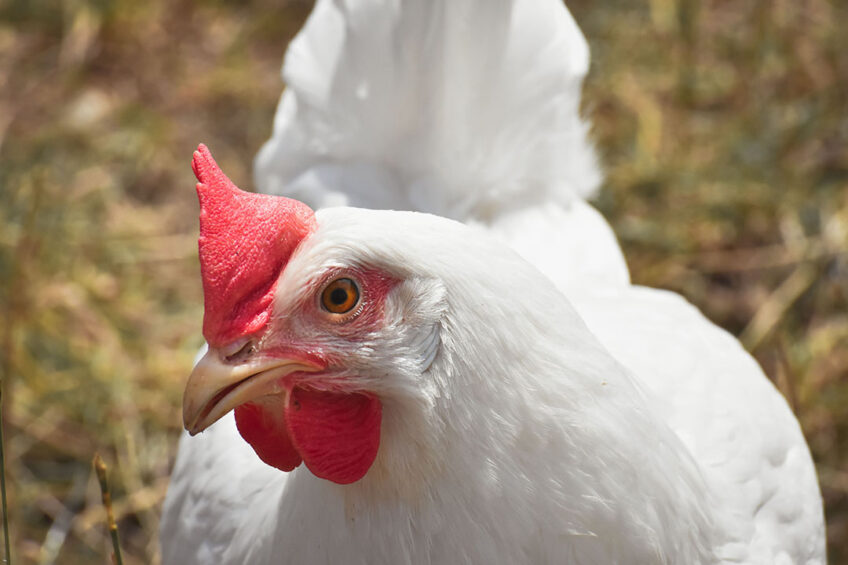Alleviating diarrhoea in broilers fed newly-harvested corn diets

The impairment of intestinal function in broilers induced by newly-harvested corn diets results in diarrhoea. A new study elaborates on how different combinations of enzymes and the probiotic Pediococcus acidilactici BCC-1 alleviates diarrhoea by improving intestinal morphology, enhancing intestinal barrier function, upregulating aquaporin factors, and modulating caecal microbiota.
As an important energy feed material for poultry, corn is often in short supply and used immediately after harvest. However, newly-harvested corn can have anti-nutritional factors and cause diarrhoea in animals. Feed-grade enzymes and probiotics can help to alleviate anti-nutritional factors in feedstuffs.
Newly-harvested corn – the problem
The use of newly-harvested corn in poultry diets has been reported to cause wet droppings and increased feed costs. Nutritionists have termed this problem the ‘new season grain problem’. It is advised to store newly-harvested grain for a period of several weeks or months to enhance its nutritional value.
In a recent study published in the Journal of Animal Science and Biotechnology, researchers found that compared with newly-harvested corn, corn that had been stored for 2 months had a decreased abundance of harmful bacteria such as Hungatella hathewayi and Bacteroides fragilis, with enrichment of butyrate-producing bacteria such as Alistipes in the gut of broiler chickens.
Corn in poultry diets – the study
In the current study, researchers evaluated the intestinal morphology, expression of intestinal tight junction proteins, aquaporins, and intestinal microbiota in broilers by adding different enzyme combinations and the probiotic Pediococcus acidilactici BCC-1 (BCC probiotic), alone or in combination with enzymes to newly-harvested corn diets.
The study had 2 control treatments:
- positive control, which consisted of normal corn that had been stored for 1 year, and
- negative control, which consisted of newly-harvested corn that had been harvested within a couple of weeks.
The other diets were supplemented with different enzymes (α-amylase, amylopectase, glucoamylase, protease, and xylanase) as well as the BCC probiotic, individually or in combination with the newly-harvested corn (negative control) diet.
The addition of xylanase and probiotics to newly-harvested corn diets alleviates their impact on the intestinal barrier by reducing the content of water-soluble pentosan and other anti-nutritional factors in newly harvested corn
Intestinal barrier function
The physical and chemical barriers of the gut are essential to gut health. Among them, intestinal tight junction proteins such as Claudin-1 and Occludin play vital roles in maintaining epithelial cell polarity and regulating intestinal barrier permeability. On the other hand, mucin 2 (MUC2) is a secreted mucin that acts directly on gut microbes preventing bacterial translocation and direct contact between intestinal bacteria and intestinal epithelial cells.
In the study, the supplementation of xylanase and the BCC probiotic individually to the newly-harvested corn diets significantly increased the mRNA expressions of MUC2, Claudin-1, and Occludin. It was concluded that xylanase and the probiotic can improve the intestinal barrier function of broiler chickens and maintain intestinal homeostasis by up-regulating the mRNA expressions of MUC2, Claudin-1, and Occludin.
In their previous study, the researchers found that the use of newly-harvested corn to formulate poultry diets resulted in decreased starch digestibility and diarrhoea in broilers. This was attributed to the high content of anti-nutritional factors such as total pentosans and water-soluble pentosans in newly-harvested corn. “The addition of xylanase and probiotics to newly-harvested corn diets alleviates their impact on the intestinal barrier by reducing the content of water-soluble pentosan and other anti-nutritional factors in newly harvested corn,” the researchers concluded.
Intestinal morphology
Intestinal morphological integrity is critical to gut health in broilers as it directly reflects the ability of intestinal digestion and absorption of nutrients. In this study, the newly-harvested corn diets resulted in decreased jejunal villus height and crypt depth, whereas BCC probiotic supplementation, individually or in combination with xylanase, increased jejunal villus height.
Although the mechanism of action of enzymes and probiotics to improve intestinal morphology was not well elaborated, probiotics have been reported to promote the proliferation of beneficial bacteria such as lactobacillus in the hindgut of the digestive tract, which may improve the intestinal morphology and function of broilers.
Ileal aquaporins
Diarrhoea in broilers is not only related to impaired intestinal barrier function but may also be related to the transport dysfunction of water ion channels in the intestinal tract. Therefore, the researchers followed up with the study of ileal aquaporins (AQP), which are a class of cell membrane transport proteins that regulate the absorption and secretion of water molecules and small solutes, regulating cell proliferation and migration and maintaining intestinal homeostasis.
In this study, the combination of protease and amylase or the combination of xylanase and the BCC probiotic in newly-harvested corn diets significantly increases the mRNA expressions of AQP2 and AQP5 in the intestinal tract of broilers. The upregulation of these aquaporins indicates that the reabsorption of water in the body is enhanced, thereby decreasing the faecal water content and reducing the symptoms of diarrhoea.
The findings of this study will provide a scientific and theoretical basis for the treatment of broiler chicken diarrhoea caused by the newly-harvested corn diet
Short-chain fatty acids (SCFAs)
SCFAs play a crucial role in maintaining the morphological and functional integrity of intestinal epithelial cells, decreasing intestinal pH, inhibiting the growth of harmful intestinal microorganisms, and improving intestinal physiological health.
The supplementation of xylanase individually or in combination with the BCC probiotic in newly-harvested corn diets increased the contents of caecal SCFAs, especially acetic acid, butyric acid, and valeric acid in broilers, indicating that xylanase and the BCC probiotic may strengthen the ability of the caecal microflora to produce SCFAs. The increased content of SCFAs in the intestine can stimulate the Na+-dependent water and electrolyte absorption of intestinal epithelial cells, thereby reducing the symptoms of diarrhoea.
Caecal microbiota
The newly-harvested corn diets resulted in increased relative abundances of Moraxellaceae and Campylobacter and decreased relative abundance of Lachnospiraceae in broilers. Lachnospiraceae reduce intestinal pH, inhibit the growth of harmful bacteria, and benefit the balance of intestinal flora. The supplementation of protease or glucoamylase increased the relative abundance of Lachnospiraceae and Barnesiella and decreased the relative abundance of Moraxellaceae and Campylobacter. Barnesiella is a key gut-protecting bacterium that can help clear harmful bacteria from the gut.
A basis for the treatment of broiler diarrhoea
The researchers concluded that the current results are consistent with the results of their previous study which indicated that supplemental protease or glucoamylase or Pediococcus acidilactici BCC-1 individually or in combination with xylanase in newly-harvested corn diets alleviates diarrhoea in broilers through decreases in the negative effect of anti-nutritional factors such as water-soluble pentosans, improved intestinal morphology characteristics, enhanced intestinal barrier function, upregulation of aquaporin factors, and modulation of microbiota.
“The findings of this study will provide a scientific and theoretical basis for the treatment of broiler chicken diarrhoea caused by the newly-harvested corn diet,” they said.
This article is based on the original article by Caiwei Luo, Liqun Wang, and Jianmin Yuan, 2023: Supplemental enzymes and probiotics on the gut health of broilers fed with a newly harvested corn diet. Poultry Science, Vol 102, Issue 7.







